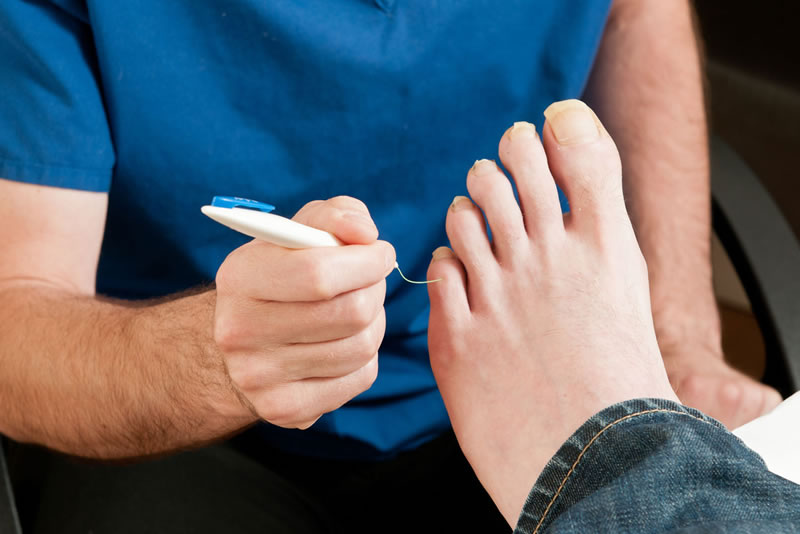Diabetic Foot Assessments
Diabetic Foot Assessments are an integral part of a podiatrists’ role in the foot health care industry. Our podiatrists are proficient in this diagnostic tool to help manage foot care for people with diabetes. Diabetes is a chronic condition which affects the entire body, including the feet. Severe diabetic foot complications can include ulcerations, infections and possibly amputation. These eventuate because, over a period of time, poorly controlled blood sugar levels lead to damage to the nerves supplying the feet (known as peripheral neuropathy), or damage to blood vessels which results in reduced circulation to the feet (or peripheral vascular disease).
Peripheral neuropathy, or nerve damage, leads to loss of sensation (numbness) of the feet, which means you may not be able to detect when there is injury to the feet. Peripheral neuropathy is the most common cause in the pathway to diabetic foot ulceration. A diabetic foot assessment will detect early signs of peripheral neuropathy and help prevent further damage to the feet. Neuropathy can also affect the function of the joints and muscles in the feet. Some diabetics may develop a Charcot foot as a result. Charcot foot is a condition causing weakening of the bones in the foot that can occur in people who have significant nerve damage. The bones are weakened enough to fracture, and with continued walking the foot eventually changes shape. This change or foot deformity can result in other foot complications.
If you have reduced blood flow, or peripheral vascular disease, this means you will have reduced healing capacity and if there is a break in the skin, reduced healing can increase the risk of infection and also help an ulcer develop. Again, early detection of reduced vascularity can help prevent serious problems in the foot.
Our podiatrists perform simple tasks, using simple tools to obtain important information about how and if you’re diabetic condition has affected your feet. During a diabetic foot assessment we look at:
The loss of protective sensation.
The vascularity of the feet.
Dermatological changes.
Level of activity.
Gait.
Footwear.
Any other medical issues.
This is all needed to determine whether a diabetic patient is at low risk or high risk to develop serious foot complications.
If you have diabetes then you need to take extra care of your feet, every day! You should check your feet daily for any changes or problems, and see our Podiatrists immediately if you are concerned. Diabetes Australia recommend that you see a Podiatrist at least once a year for a foot health check, or more frequently if your Podiatrist advises that you are high risk. Your Podiatrist will do a thorough neurovascular assessment which can help to detect any changes early, and advise you on how to manage your foot health in order to reduce your risk of developing serious foot complications.

